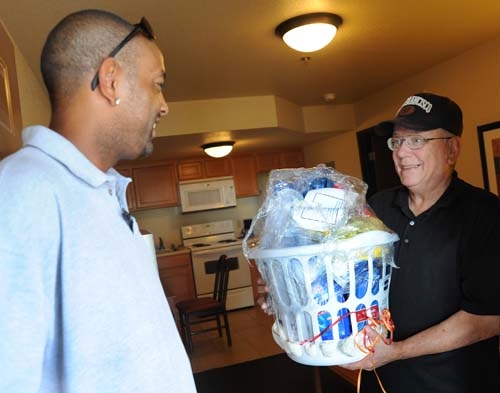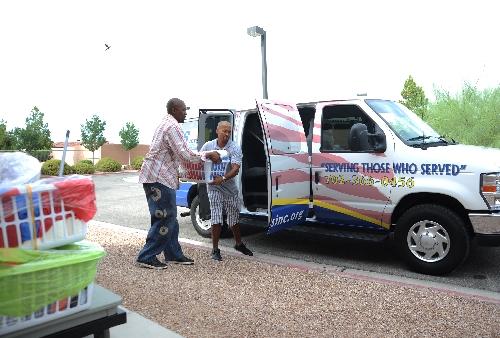Housing vouchers help valley veterans get off streets
Joseph Kyzour surveys his kingdom, a modest one-bedroom apartment in the southwest valley.
And he chokes up.
The roof and four walls are a far cry from the homelessness he experienced four years ago when the economy soured. The Navy veteran, who served in Vietnam, lost his job. His car broke down. The money ran out. And the 65-year-old found himself walking into Catholic Charities.
He needed help.
"I said to myself, 'I'm not going to be homeless. I'm a proud veteran,' " Kyzour said.
But he was. There was nowhere else to go.
Kyzour is now one of 84 formerly homeless veterans who received federal housing vouchers from the Veterans Affairs Supportive Housing Program, which offers rental aid, case management and clinical services provided by the Department of Veterans Affairs.
"Now that I'm here I can't stop giggling," Kyzour said last week. "I just want this to be a place where I eat supper, take a shower, get a little rest and go back out to work. That's what I want to do. If you're not contributing to society, with the needs of society right now, you're not much of a man."
He points to two used television sets, which allow him to watch two football games at the same time. He notes his two air conditioners, his king-size bed and his "top-end" shower.
"I think the U.S. government did well by me," Kyzour said. "I'm very, very happy, and I get a little emotional about it."
Last week, a group of volunteers from the Veterans Affairs office in Southern Nevada, the nonprofit U.S. Vets, which provides support services to homeless and at-risk veterans, and other agencies handed out laundry baskets of household items to help veterans, such as Kyzour, get on their feet.
Mops. Plates. Forks. Knives. Cleaning supplies.
"Once these vets have a roof over their head and four walls, that's just the starter," said Curtis Hall, a U.S. Department of Housing and Urban Development systems coordinator. "They lack some of the basic necessities for independently living, things we would take for granted."
Twenty-six of those veterans who were housed were deemed vulnerable by a homeless survey conducted by Clark County officials in June.
The goal was to find them permanent housing based on a system that ranks how likely they are to die on the street from health complications, criminal attacks or substance abuse, among other dire conditions.
The information was stored in a database by advocacy groups to keep track of the chronically homeless, determine what resources are needed and identify the most vulnerable veterans.
Tyrone Thompson, regional initiatives coordinator for the Southern Nevada Regional Planning Coalition, said support is the key to keeping veterans housed.
"We're making sure we have intensive case management to check in on the veteran on a regular basis, to help them just get acclimated and stabilized because this is their home," Thompson said.
It's been a relief for Army veteran Michael Terry.
More than once, someone has found the 54-year-old passed out in the streets of Henderson. Terry suffers from epileptic seizures, and his body is covered in scars from falling down unconscious.
Terry said he was in and out of jail on charges of fraud and disorderly conduct, and his alcoholism was out of control.
He hit his low point when he was living in a tent. Sometimes he would crash with relatives. That happened for 15 years.
"I'm getting a little too old for this B.S.," Terry said. "I thought maybe I better start doing something better. I'm getting nowhere, and I'm getting older."
So he turned to religion. It helped him get sober, he said. It's been two years and three months since his last drink.
"I did enough drinking for a lot of years," Terry said. "I would panhandle, drink it up for the day, go back out and do it again. I just got tired of that shit. Now I'm better off."
Contact reporter Kristi Jourdan at kjourdan@reviewjournal.com or 702-383-0440.


















